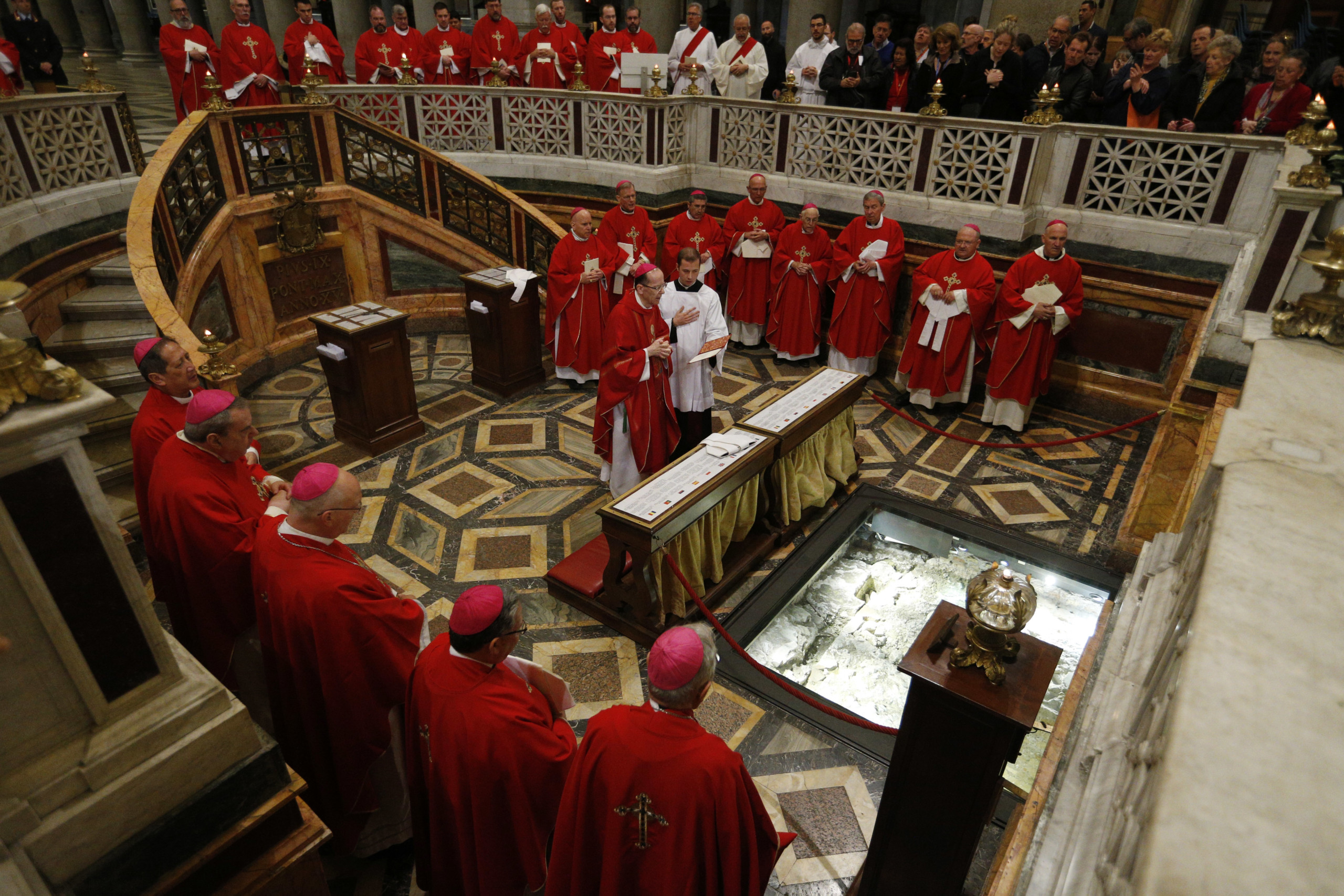Following is the prepared text from Bishop Olmsted’s homily for the 17th Sunday in Ordinary Time.
August 2, 2020
“Nothing can separate us from the love of Christ.” St. Paul marveled at this fact. No matter what he suffered, it never kept him from experiencing of God’s love. In fact, every crisis he faced brought him closer to Jesus, every betrayal he endured made him more confident that the Lord would never betray him. Over and over, Paul found that the best way to tell people about the love of God was to recount all the hardships he endured. He writes, for example, to the Corinthians (2 Cor 1:5ff),
“For as Christ’s sufferings overflow to us, so through Christ does our encouragement also overflow… Our hope for you is firm, for we know that as you share in the sufferings, you also share in the encouragement.”
As St. Paul was writing his Letter to the Romans, He certainly had in mind his experiences as an Apostle of Jesus: the five times he “received forty lashes minus one”, the “three times he was beaten with rods, once that he was stoned, the three times he was shipwrecked” (2 Cor 11:25f). None of these caused Paul to doubt God’s love. Quite the opposite! His trust in God’s love came to life even more through these ordeals. Through what he suffered, St. Paul was most profoundly convinced that God loved him. That’s why, on many occasions in his epistles he wrote about his sufferings; not to win people’s pity but to awaken them to the amazing experience of Jesus transforming hardships into deeper love. Today’s Sacred Readings invite you and me to ask questions like these: is there something weighing down my spirits? Is something robbing me of my joy? Am I losing hope? St. Paul wrote (2 Cor 5:14), “The love of Christ impels us.” Is that true for you? Would you like it to be so?
Notice that the love of God not only allowed Paul to survive difficult things, it allowed him to triumph, “to conquer overwhelmingly.” So, if someone asks you how you are coping with the Coronavirus pandemic, do you respond, I’m surviving. I’m getting by. Or can you say with St. Paul:
“…in all these things, we conquer overwhelmingly through Him who loved us. For… nothing will be able to separate us from the love of God in Christ Jesus our Lord.”
However, there is one person whom God allows to separate us from His love—Me! Each of us! He leaves us free to turn our back on Him. That is called mortal sin. Notice the things that cannot separate us from Christ’s love are painful experiences like anguish and suffering. What can separate us from God’s love are sins like adultery, immorality, idolatry, debauchery, and other serious wrongs. If we sincerely seek God’s forgiveness after gravely sinning, however, the Lord looks upon us with mercy.
In our First Reading today from the Prophet Isaiah (55:1-3), God tells us that poverty never gets in the way of the Lord’s love; quite the opposite; the less we have the more God’s love overflows. The Lord calls out to us as His dear children:
“All you who are thirsty, come to the water! You who have no money, come, receive grain and eat; Come without paying and without cost, drink wine and milk!”
The one thing that never gets in the way of God’s love for us is our poverty. But so often we think it will. Look, for example, at the Apostles in the Gospel today. They say, “This is a deserted place… dismiss the crowd so that they can go to the villages and buy food for themselves.” What a disappointment their words must have been to Jesus. The Apostles tell Jesus to send people away from Him, rather than inviting them to draw near. They had forgotten that, during the Exodus out of slavery in Egypt, God provided “manna” from heaven for the people to eat, and He gave them water from a rock. The less they had the greater was God in generosity.
So, rather than sending the crowd away, Jesus told them, “There is no need for them to go away; give them some food yourselves.” The Lord is asking the Apostles to do what is beyond their own resources—i.e. feeding 5000 men and their families. The Lord often asks us disciples to do what, relying on our own resources, is impossible. But nothing is impossible with the Lord. So, how did the Apostles face the food crisis: they placed the 5 loaves and 2 fish in Jesus’ hands. And that is the key to coping with what is beyond our own strength; we just obey His command: “Bring them here to me.” Jesus does not work without us. He works with us. He calls us by name and engages us in His own work of mercy. So, when we come across what seems far beyond our own resources, let us not give up hope, and not try to do it alone. After the Apostles placed the few loaves and fish in Jesus’ hands, the immense crowd had more than enough to eat. “They all ate and were satisfied and …twelve wicker baskets full were left over.” The miracle of the loaves and fish far-surpassed the needs of the people.
The Church has always seen in this miracle a symbolic anticipation of the Eucharist. At every Holy Sacrifice of the Mass, Christ performs a miracle so great that our mind cannot fully grasp it; He gives us His own body and blood as food and drink. And He tells us, “All you who are thirsty, come. Come to me heedfully; listen that you may have life.”





